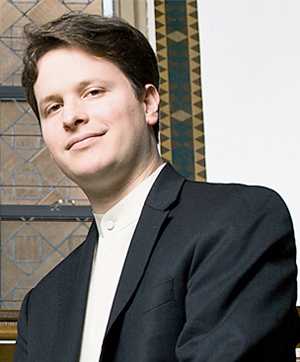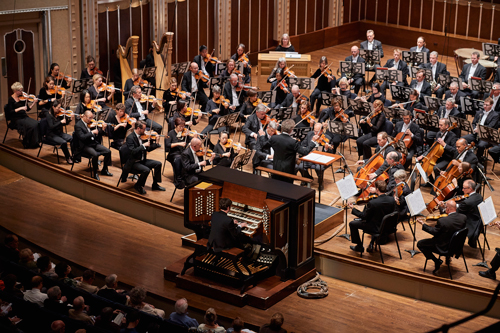by Daniel Hathaway

“Some composers find the organ daunting — understandably so — and will avoid writing for it altogether,” Jacobs said in a telephone conversation from his studio at the Juilliard School, where he heads the organ department. “But Stephen was someone who embraced the instrument, understood it, and composed very beautifully for it.”
Paulus, a prolific composer who lived and worked in the Twin Cities, wrote four concertos for organ and orchestra before he died of a stroke in 2014. “I premiered the fourth concerto with the Phoenix Symphony a year or two before he passed away, so I got to interact with him a bit — and what a tragedy his death was for us all,” Jacobs said.
The concerto that audiences will hear on Friday and Saturday evenings, November 24 and 25 at 8:00 pm, and Sunday the 26th at 3:00 pm, was commissioned by the Dallas Organ Competition and premiered in 2004. Guerrero has previously performed the work with Nathan Laube and the Nashville Symphony, but Jacobs will be playing it for the first time this weekend.
Why a ‘Grand Concerto’ while the other three Paulus works are merely concertos? “I suppose because it requires the full forces of the orchestra, and reveals a glimpse of the marvelous tradition of music for organ and orchestra experienced too infrequently by regular concertgoers,” Jacobs said.
“It offers a thrilling journey for the listener, beginning rather quietly, but quickly giving way to a jaunty, rhythmic first movement, followed by his trademark lyricism in the second.” Jacobs noted that Paulus was a very successful opera composer, as evidenced by his score for The Postman Always Rings Twice. “He had this love of melody that comes in full display in the second movement, interrupted briefly by a kind of bubbly scherzo-like texture, and then returns to a long, meandering melodic line. And all of this gives way to a joyful toccata with an exhilarating conclusion. There are moments of playfulness to this work, which is utterly attractive to any listener.”

Jacobs is bullish on the organ as a mainstream instrument in classical music, and he says he’s both optimistic and pessimistic about its future. “I remain hopeful in large part because of what I witness regularly with my students at Juilliard — not only their talent, but their commitment to advancing the cause of organ playing with an acute awareness of the unique challenges that the instrument faces. I do fear that too many organists are either content with being in a bubble, or they can be a bit too inward-looking. We have really got to earn our stature, artistically speaking, or it’s not going to happen. It’s not enough just to be enthusiastic about the organ. Organists need to be able to deliver on par with any fine pianist, violinist, or singer.”
What Jacobs calls the “elite” institutions of classical music are often indifferent to the instrument, and the classical music industry can be apathetic. “The organ is not part of the regular lives of symphony orchestras and mainstream summer festivals. Radio stations play next to no organ music, and many music critics would never consider reviewing organ performances,” Jacobs said. “Consequently, organists have just developed their own world and networks, but this has never been satisfactory to me personally. Some would prefer to be big fish in small ponds. I’d rather take a swim in the ocean.”
Photo of Jacobs and The Cleveland Orchestra with Franz Welser-Möst by Roger Mastroianni.
Published on ClevelandClassical.com November 20, 2017.
Click here for a printable copy of this article


